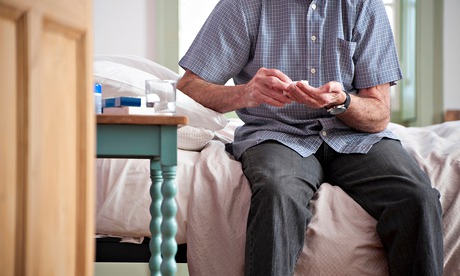
Another day, another bit of exciting news about a medical breakthrough. For a multiple sclerosis patient like me, the course of a day can see you raised from a height of happiness and expectation at a headline to a low brought on by qualification and small print. In some ways, the greatest breakthrough would be a pill that protects one against those highs and lows. Meanwhile one has to fall back on an ability to read between the lines, differentiate journalistic hyperbole from medical realism, and come to a conclusion that allows for hope but prepares for disappointment.
Today's news is that certain statins, taken in high dose, may help to slow down the progress of MS in its later stages. At first glance this seems like two marauding birds killed with one very cheap stone. As a 53-year-old man who enjoys a sausage roll, I have been worrying more about my cholesterol levels recently than about the symptoms of my MS, and here comes a pill that promises to deal with both. Suddenly, fears that I had about the side-effects of statins are dissipated by the hopes that one has about the side-effects of statins. Where before I had rejected the idea of going on a drug like that every day for the rest of my life, now I can't wait to get down to the GP to get put on the trial dose.
Four times the normal? What the hell? Make it eight times, please, and how does it fit in with the extra vitamin D3 I am taking, and the extra folic acid and vitamin B12, and cod-liver oil by the spoonful, and all the other things that have been recommended by medical personnel and friends?
But underneath all this optimistic clutching at straws there is the recognition that one has an illness, an illness that is not going to go away, that is probably going to get worse and that – even if this new miracle cure proves to be true – will slow the shrinking of the brain only from 0.6% to 0.3% a year. On the other hand, never have three-thousandths of the trillions of neurons and nerve cells in my brain seemed so valuable and worth preserving.
And this is the problem: the unrealistic optimism that is an essential part of human character drives us to believe in miracle cures, whether they be statins, the lottery, or the spittle of a supposed messiah. Life without the highs and lows of hope and dashed expectations would hardly be a life worth living.
When writing about my diagnosis in the Guardian some years ago, I said that science was not my god, but it may be my salvation. That remains my position today, and I think it is often the position of many people with many different diseases and illnesses. Underneath the pills and lotions and new-age quackery that our pains and aches lead us towards, there is an undertow, an underpinning and an imagined certainty that – as with all those other diseases that were once so common and are now so rare – ours too will one day be a distant memory. Maybe not to us, but, as Brecht once put it: to those who come later.

